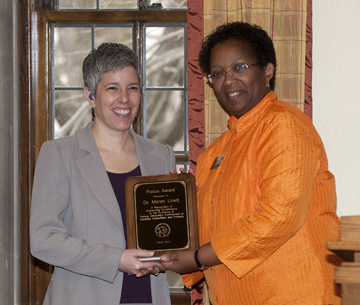Focus Award winner honored for expanding disability studies

Maren Linett (left), associate professor of English, receives the 2012 faculty Focus Award from Alysa Rollock (left), vice president for ethics and compliance. (Purdue University photo/Mark Simons)
Purdue presented four Focus Awards on March 1 for outstanding contributions to furthering the University's commitment to disability accessibility and diversity. Today, Purdue Today is featuring the faculty recipient, Maren Linett, associate professor of English.
By adding another dimension to literary and cultural analysis of modernist literature, Linett is part of an effort to move disability studies into mainstream academics. Last semester, Linett designed and taught a graduate course on modernism and disability. This semester, Linett is teaching an undergraduate equivalent of the class that broadens the focus beyond modernist literature.
Her work to broaden the conversation on disability studies earned her the 2012 faculty Focus Award.
"My students are used to searching through literature for issues of race, class, gender and sexuality," Linett says. "I want them to begin to understand that disability is another area of importance because it is one way we categorize and essentially qualify or disqualify others."
The courses offer students opportunities to engage in meaningful and critical discussions about how disability is represented in literature. Through analyzing early 20th-century texts, they learn to recognize and question the normative assumptions that often arise in contemporary discourse.
Identifying these assumptions is more than just pinpointing stereotypes within the texts, Linett says.
"To only identify stereotypes is to remain at the very surface of literary disability studies," Linett says. "These classes go further, by looking at cultural meanings that are given to disabilities in the context of these works. We look at memoirs written by people with disabilities, fiction about people with disabilities and academic articles about disabilities in order to identify the cultural work performed by disability in the texts."
Through their class work, Linett wants to shift students from looking at disability as a "lack" of certain traits to viewing disability in terms of "difference." So far, Linett says, both graduate and undergraduate students have embraced this new perspective.
"I've had great feedback from the graduate class," Linett says. "Students seem to really enjoy developing this new perspective. Right now, the undergraduates are great because they build off each other's ideas and generate insightful class discussions."
Linett's dedication to developing disability studies courses and scholarship isn't going to end with the new classes. In the near future, she hopes to help form an interdisciplinary minor at Purdue.
"Right now, there are a handful of places around the country where you can get an undergraduate degree or doctorate in disability studies. An interdisciplinary minor here would be a great addition to the undergraduate experience," Linett says. "I know that I have colleagues who are interested in expanding the area as well. Honors like the Focus Awards are so important for expanding this interest and raising awareness of diversity and disability at Purdue."
